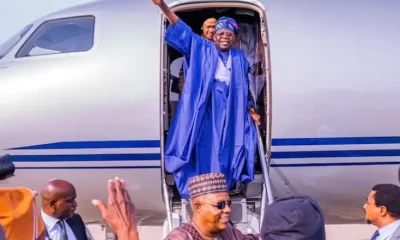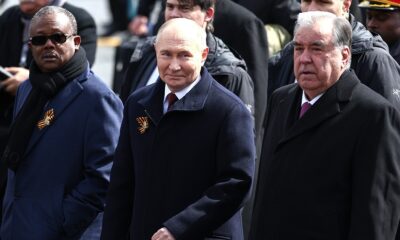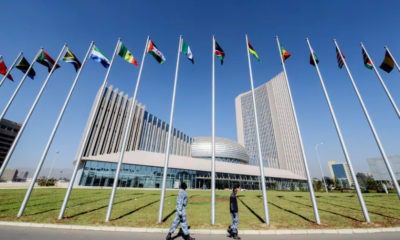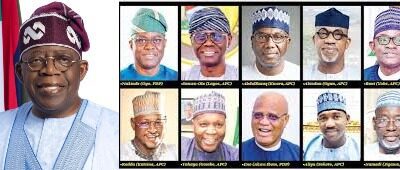Global Issues
Unity and Faith, Peace and Progress -By Sesugh Akume
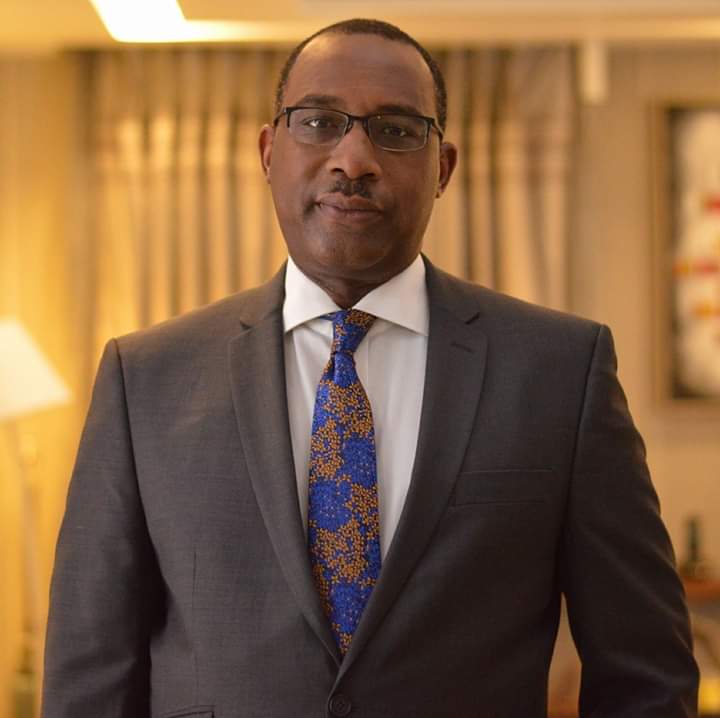
(Being excerpts of a keynote address presented at the colloquium themed ‘Unity and Faith, Peace and Progress’, organised by the Haske Foundation in honour of its founder, Haske Kudla Satumari, to celebrate his life of service and mark his 50th birthday, at Shehu Musa Yar’Adua Centre, Abuja; on Saturday 24 March 2020.)
Protocol
The theme of this important colloquium is also the motto of the Federal Republic of Nigeria. Considering that this year is also Nigeria’s 60th Independence anniversary, it is important to take a look at the country’s motto, and x-ray how it has been along this journey, and where we have been heading. This should provide us with an opportunity to reflect and determine whether we are on the right path, whether we are pleased with the journey so far, and what we can do about it.
Let us briefly consider each of the components of the theme: Unity, Faith, Peace, and Progress.
Unity
It is rather shameful that after 60 years of Independence, we are presently more divided than we have ever been in our history. Some give reasons of our large population, but Nigeria is not the most populated country in the world. Others give reasons of diversity, but Nigeria is not the most diverse country in the world either. In fact, the opposite of unity is not diversity, but disunity. Diversity is not disunity.
The things that bind a people together are a shared identity, shared values, shared dreams and goals. If I may ask, what is the Nigerian identity? What makes you a Nigerian? What values do we agree on and subscribe to? What is the Nigerian dream? What is that compelling idea that galvanises us that we are working towards? None. How then can we build unity when we have nothing compelling binding us?
Many of us don’t know what the Nigerian Dream is, but it exists. It’s right there in our constitution. May I say emphatically that the Constitution of the Federal Republic of Nigeria 1999 is the number one promoter of disunity in Nigeria. I will get to that shortly.
Faith
Every person here (and elsewhere) who wants to be honest would confess that this country is not working! Let’s not pretend about it. We however express hope and optimism that Nigeria is a great and endowed country which will someday make it. For how long have we been hearing and saying this?
There is a marked difference between optimism and faith. Optimism is not faith. Hope is not faith either. In order to have and exercise faith we must first of all tell ourselves the truth. The problem is we lie a lot. We are not an honest people. We are mostly hypocrites.
Telling ourselves the truth means admitting that this country has not been working, and has never worked. Things have progressively become worse, so it’s easy to look back years ago and compare what was with what is and say it worked yesterday things only got bad. No, it didn’t, and things only got worse and keep getting so. Until we begin at the point of truth, we shall only be going round in circles of charades, deceiving ourselves.
‘Faith without works is dead.’ What demonstrates our faith is not the hope-filled, optimistic, and nice-sounding words we say to make us feel happy, it is what we actually do. What have we been doing beyond the words we utter? What are we willing to do as we later depart from this place. If after this event each one of us doesn’t determine what we will begin to do or do differently, then this event would’ve been a waste of time. Let us see the faith in our doing, not our saying.
Peace
Dr Martin Luther King, Jr said, ‘True peace is not merely the absence of tension: it is the presence of justice.’ We keep making the error of conflating the absence of violence and restiveness with peace. It is not. Without justice there can be NO peace. We will know no peace in Nigeria until and unless there is justice. Everything we do in Nigeria is based on wickedness and injustice, how can there be peace? How?! A year ago, on the morning of 21st March, at Nyanya, right here in Abuja, just about 4 kilometers from this place, a law enforcement officer, an assistant superintendent of the civil defence, Ogah Jumbo Ochigbo, in his uniform, was beaten to death by 2 police officers in broad daylight in the pesence of his wife, Ada, and two sons Emmanuel age 6, and Daniel whose 3rd birthday the family was organising and looking forward to host in 2 or so days at the Millennium Park.
What did the police do about it? Frank Mba, the police spokesman lied on behalf of the Nigeria Police Force. The Divisional Police Officer (DPO) and the 2 culprits have been transferred out of Abuja. The matter has been buried. Case closed! Do you not think that the blood of an innocent Ogah Jumbo Ochigbo is crying for vengeance? How can you have peace in a country where human lives don’t matter? How can there be peace amidst such grave injustice? How do you expect traumatised Emmanuel and Daniel to see Nigeria, a country where as children they watched their father murdered in public, yet the matter was covered up, buried, and everybody moved on? You think the tears of that widow, Ada, will go unanswered?
This is one of many examples. This happened right here in Abuja, the seat of government. It happened in broad daylight, in the public view, and to a law enforcement officer in his uniform. Stretch your imagination to what is happening everywhere else across the country to everyday Nigerians.
Wickedness everywhere you turn. How can there be peace with injustice? People spend their entire lives pursuing a career, on retiring, simply giving them their terminal benefits, what is duly theirs becomes a tug of war. Some waste their remaining years when they should be resting and savouring the fruit of their lifetime labour hustling and pursuing what is theirs till they die. What sort of injustice is that?
People cannot get employment or promotion at work by merit. They are denied these in favour of others with ‘connections’. People cannot have what is duly theirs. We cheat them and deny them their rights and think there can be peace? Without justice there can never be peace. There can never be unity in the absence of justice.
We are in a country where the overwhelming population, 70% of us, live in penury and the hardship is increasing daily. We have now become the country with the largest number of desperately poor people, with the highest percentage of poor people, and growing with widening gaps of inequality. In fact, experts say if things continue as they are, Nigeria will constitute 25% of the world’s poorest in the next 10 years. How can there be peace in such a country?
Progress
Nigeria as a country was founded on injustice. Those roots and foundation from almost 200 years ago persist to this day. Note that when the British set up the Colony of Lagos, it wasn’t for the benefit of the people of Lagos. Neither was it for the benefit of the people when on 1st January 1900, Sir George Taubman Goldie of the Royal Niger Company sold the territories that compose what is today Nigeria to British government for £865,000, handing her over to their representative, the then Captain Frederick Lugard, who set up and proclaimed the Southern Nigeria, and the Northern Nigeria Protectorates at Mount Patti, Lokoja (in present day Kogi state.) The same very scenario occurred on 1st January 1914 when the Southern and Northern Protectorates were amalgamated to form one ‘united’ Nigeria under Sir Lord Frederick Lugard as governor-general . It had nothing to do with the Nigerian people, it had all along been about transactions for the benefit of the British and their administrative convenience, end of story!
May I respectfully submit to you, Mr Chairman, distinguished ladies and gentlemen, that Nigeria was set up for the exclusive benefit of those who own and run her, not for the Nigerian people, not for the country herself, but for an exclusive class. So it was in the beginning, set up exclusively for the benefit of British interests. Let no one deceive you that things changed on 1st October 1960. They did not. They handed over to Nigerians but still controlled the levers, otherwise what was the Anglo-Nigerian Defence Pact of 1963, for instance, all about? They also handed over power to those they were most comfortable with, and indeed, not one of the structures they set up to run the system has been dismantled to this day. To this day, Nigeria has been all about transactions.
The structure and system therefore favours only those closest to power. The system is designed to take care of an exclusive set of people, excluding the vast majority. It is designed to use and dump the country. As it was in 1960, so was it in 1999 when the military pretended to have left and handed over to civilians. In the same way the British pretended to leave in 1960 but their structures and systems and the extractive mindset of colonialism and imperialism remained intact, so was it in 1999, and it is alive up to this very moment. In 1999, this structure and system was codified in the fraud, and instrument of retrogression called the 1999 constitution which the military foisted on us.
When, therefore, progress is being discussed, the question should be asked, whose progress are we talking about?
A Brief Look at the 1999 Constitution
Every negative thing about Nigeria is found codified in that document. From disunity, divisiveness, to injustice, insecurity, an entitlement mentality, unpatriotism, selfishness and self-centrednesss, exclusion, unproductivity, an aversion for merit, competition, or fair play, and every other thing you can imagine.
Whereas other countries position themselves after great ideals, and describe themselves with catchphrases as ‘the Rainbow Nation’, ‘Land of the Free and Home of the Brave’, ‘The Empire on Which the Sun Never Sets’. Or inspiring and aspirational belief systems such as a being a country of equal opportunities, whereby anybody whoever they are, if they are willing and pay the price in hard work can rise to any height and be anything they want to be, and so forth; in Nigeria the 1999 constitution makes it all about being in the position to eat one’s share of the national cake. That, Mr Chairman, distinguished ladies and gentlemen, is the Nigerian Dream.
You may find this funny, but it’s not a joke. Turn to your constitution at Schedule III, Part I (C) 7 and 8, the constitution is not joking when it uses words like ‘distribution’ and ‘sharing’ when referring to government positions. How do you share and distribute, work? You share and distribute goodies, bounties, and the like. That is what public office is about sharing, distribution, everybody getting their own share. It is so serious that in section 14(3) it says these positions should be shared equitably so that everybody can get to eat, it should be done to reflect federal character. Not that some would eat and forget others.
Why do you think the constitution insists that we shouldn’t have less than 37 ministers, 1 for each state? So that the sharing and distribution can go round. It doesn’t matter that we don’t need 37 ministers. When next you wonder why we are more fixated on who/which zone got what ‘juicy position’, instead of who is actually doing the work to make the country great, there you have it. It’s not about creating greatness, it’s about consumption, distribution and sharing. It’s about eating, having one’s own share. And it’s right there in your constitution.
In every other country I know, once you are a citizen, you are a citizen and that settles it. In Nigeria, we are all citizens but some are settlers, others are indigenes depending on where you reside. What brought about this dichotomy? Look at section 147(3) of the constitution it created this confusion.
In the past months, I can’t count how many lady justices who had spent 30 years of their careers in the state judiciaries, who were the very best, and most senior, even acted as chief judges but in the end someone inferior was sworn in as the substantive chief judge of the state (usually a male) why? They were not indigenes, even if married to an indigene and spent all their productive years there. This is such injustice and wickedness! Where did it originate? You guessed right. The constitution. I know Nigerians who are judges in other countries and are on unhindered, unfettered career paths to reach whatever peak. No one asks of their stated of origin. In Nigeria, even as a citizen, you can’t so aspire and be sure. Yet we talk of unity, peace, and progress? What do those mean, really?
The injustice, aversion for merit, productivity, fairness, and ecen healthy competition promoted by the constitution is so rife that children wrote the federal common entrance in 2019, any child in Abia who scored 120/200 failed, and a child in Zamfara who scored 15/200 passed. Quota system. Sharing the national cake. This has been going on for decades. How do you explain to any child that 15 is greater and than 120? The reasoning is, some states are ‘educationally less developed’ and have been so since forever, and will continue to be because there is the incentive of low performance to keep being ‘educationally less developed’. The constitution prefers to have different scales for different sets of people, and lower the standards for others, not maintain one standard we all should aspire to.
Did you know that even though the world over, it is accepted that there are 3 co-equal arms of government in every democracy, in Nigeria the judiciary is under the executive, ie the president and governors? See section 153(1) the National Judicial Council, and Federal Judicial Service Commission are all agencies under the executive, not judiciary, but under the president. And so is it at the state level. Even the Independent National Electoral Commission (INEC) is under the president. How then can it be said to be independent?
The constitution also gives power in one hand and collects it back with the other. For instance, it establishes the local government system and empowers the states to create and legislate their functions and activities in sections 7 and 8, but usurps those same powers by putting the National Assembly in the place to ratify them first, along with a constitutional amendment to make the valid. So what was the point of making it possible for the states to create them and turning around to make it impossible? Local governments are supposed to be autonomous but in section 162(5) and (6) it usurps their financial autonomy and hands it over to the state governments, or more specifically, their imperial overlordships, the state governors. If this isn’t fraud then I don’t know what it is.
The local government system is the most important tier of government because it is closest to the people. In the US, for instance, there are up to 80,000 of them in 50 states, in Nigeria there are 774 of them in 36 states. But why do we need 36 states that can’t take care of themselves but rely on the federal government, which itself relies on oil rent and loans? Is this sustainable? Do we actually need 36 states? Are states and local governments to rely on the federal government or take care of themselves and rather contribute to the centre?
Nigeria deceives herself that she is a federal system but the facts state otherwise. There is the notorious Schedule II, Part I called the ‘Exclusive List’ which puts virtually all powers in the federal government including responsibilities that are carried out by the local and state governments in every other normal country. For instance, security. Under item 45, it rests all security with the federal government, how workable is this, and how has it worked? Going by the 1999 constitution, Amotekun and other state security bodies are all illegal. States cannot legislate on security matters. But what do we do? So far, the security system has failed terribly. When will this aspect be amended so that security can be decentralised? Others have already gone ahead against the constitution because, truly, we have to survive and be alive first before talking about what the constitution says.
Each local governments should have their own police departments, in fact, in the first republic it was so. But in this 1999 constitution there’s only 1 Nigeria Police Force with its headquarters in Abuja. How is it realistic for the Nigeria police to be everywhere and master all the nooks and crannies under one inspector-general of police operating from Abuja? Apart from every local government has its police department, even the National Assembly should have its own police. That is how it’s done.
The constitution doesn’t want people who can generate, transmit, and distribute their own electricity, and contribute the excess to the grid, it insists they have to rely on the single and constantly failing national grid that crashed and put the entire country in pitch darkness 12 times last year alone. If you have minerals in your backyard it’s Abuja that controls it. As long as Abuja is not doing anything about it, so will they lie untapped. Wouldn’t it have been better to explore and exploit them and pay taxes to Abuja? The constitution thinks differently.
The examples are innumerable, but I’ll pause here. A constitution should provide the footing to propel us upward and forward, but as we all can clearly see, the 1999 constitution is designed to hold us back and keep us down. The consequential amendments that will cause a shift are so many that it is better to consult with the people and come up with a new workable one. Virtually every National Assembly has attempted to amend the constitution, some of the amendments are important and tried hacking at the leaves, but as is evident, this is a root, fundamental, foundational, and structural as well as systemic problem, not a cosmetic one. Mr Chairman, distinguished ladies and gentlemen, whenever we Nigerians are ready to make Nigeria work, we will first have to ditch this constitution and write a fresh one. Until then let’s keep pretending.
The Celebrant
I am indeed pleased to be here to honour the celebrant on his Golden Jubilee. We usually don’t celebrate people until they die then we give beautiful funeral orations. I am delighted that the celebrant is here with us as we appreciate and celebrate a life well lived, and in service of others above self.
Haske Satumari has been in the aviation sector for close to 3 decades, and a philanthropist. In 2007 he was invited to run for the state assembly in his home state, Borno but declined. He preferred doing his bit outside the system as a philanthropist, not a politician. In 2011, however, he succumbed to the pressure but ran unsuccessfully for the office. One other thing that is intriguing about this exceptional and exemplary Nigerian is, even after losing the election, he still went ahead to fulfill all his campaign promises from his pocket! He had no social contract with the people, but still carried out his promises. How many people promise heaven and earth and forget those as soon as they get what they want? In fact, how many promise what they know they won’t do? The interesting thing is many times the politicians lie, we know they are lying, they know we know they are lying but we still go ahead to collect their monies and vote them, and then turn around to complain. And pray to God to touch our leaders and heal our land. We are such hypocrites. A most religious people but rather godless.
In 2019, he unsuccessfully run for the senate, we all know what happened. I saw the exhibits tendered in court to challenge the electoral heist, amd all I could do was shake my head.
We can learn character from this individual. Don’t say what you don’t mean. Don’t say nice things in public and be a different person entirely. If we had people of character in this country we wouldn’t be in such a deep mess as we are today.
Giving is a gift, so they say. Some, they say, are particularly endowed to give to others. But it can also be learnt. Selflessness which makes people give of themselves to serve others, to sacrifice for the common good is not a gift. This, we all can learn.
The celebrant has more than 300 students on scholarship at the University of Maiduguri alone,drawn from all parts of the country most of whom he has never seen in his life. So are beneficiaries of his aid and outright sponsorship in various aviation training schools in Nigeria and around the world. Many for whom he finds placements in airlines and other aviation companies after their trainings. How much better the world would be if more and more of us would do the part we can to lift others up. There is something each one of us can do in our respective capacities.
Conclusion
We cannot build a country on a foundation of injustice. It is sad that 60 years after independence, we are having these discussions, but it’s better late than never. Unity, peace, and progress have eluded us, but we can keep the faith. Not hope, not optimism, but faith which is demonstrated by what we do, not what we say.
Nigeria’s issues are structural, there are mainly at a macro level, and cannot be resolved by philanthropy and other activities at the micro level. But imagine how far philanthropy would go, if we had a fuctional system! Everyone of us has a role to play reshaping the structure of this country. Find yours and play it. That is faith.
I thank you for your time.

